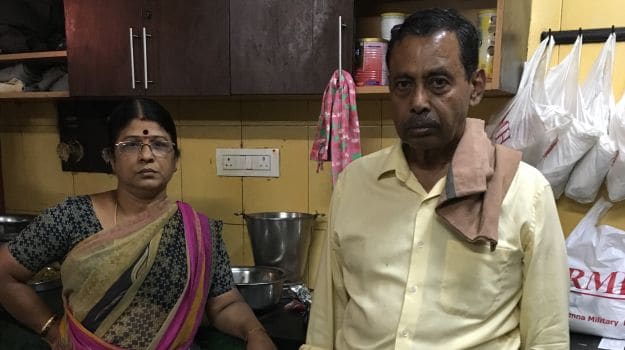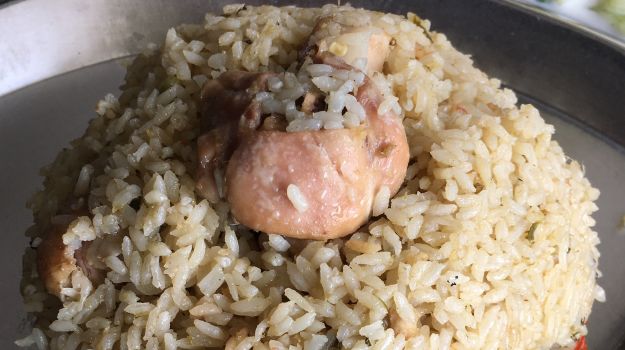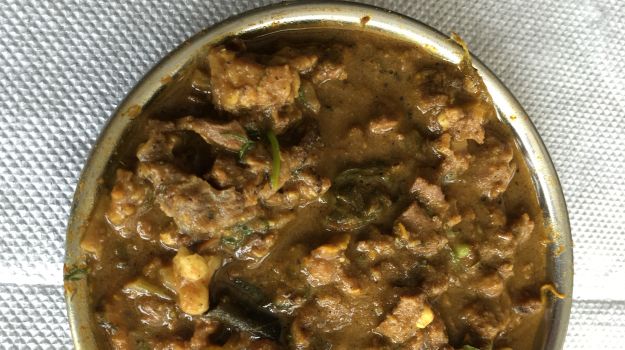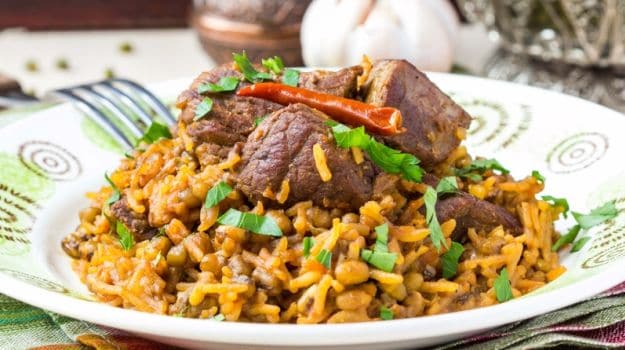Ranganna Military Hotel might not be the oldest Military hotel in the city but it has acquired a hallowed reputation since 1962 when it first opened its doors. My first impressions were a complete contrast from what I expected. Simple yet spotless interiors, lots of natural light and a spacious kitchen where hygiene is paramount. There are hardly any props except a clutch of framed sepia images from the 60s and 70s. Images of Munirangappa (aka Ranganna) then a famous wrestler in these parts after whom this restaurant is named. Ranganna’s son Sunil Kumar mans the counter now and keeps an eagle eye on his diners making sure everyone is being looked after. That can get quite tough by 1:30 pm on most days, when the restaurant is bursting at its seams. A move to a larger, new location in Jayanagar is still not enough to cater to the large crowds.
 Ranganna and His Wife in The Kitchen. Image Credits: Ashwin Rajagopalan‘Our regulars make us what we are today’. Sunil is clear that it’s old Bangalore that makes military hotels like Ranganna thrive. The newer, ‘epicurious’ types might make the one-off trek for that ‘been there ate that’ Instagram moment but it’s still a habit for the die-hards. I ask Sunil about the restaurant’s culinary origins and his response is quite nonchalant – ‘we serve Bangalore-style military food’. He adds that Bangalore has always been a melting pot, making it tough to single out a dominant culinary influence from a specific region or community. Gentrification might not be a 21st Century phenomenon in Bengaluru after all.I first sample Ranganna’s evergreen mutton biryani. Mildly spiced and cooked with Seeraga Samba (the same small grain rice that is a ‘must’ ingredient for Biryanis in Ambur and Dindigul in Tamil Nadu). It’s the same type of Biryani that is served in cups crafted with Arecanut palm (donne) that the city calls Donne Biriyani, except here it’s served in a plate. Sunil typifies the establishment’s unassuming demeanour. No tall claims, a limited menu and a laser focus on getting the best ingredients into their kitchen. Ranganna still handpicks the meat and spends hours in the kitchen with his wife, while the masalas are freshly ground and come from the same supplier at City Market nearby. It’s the same template for most military hotels in the city where mutton has been the mainstay.
Ranganna and His Wife in The Kitchen. Image Credits: Ashwin Rajagopalan‘Our regulars make us what we are today’. Sunil is clear that it’s old Bangalore that makes military hotels like Ranganna thrive. The newer, ‘epicurious’ types might make the one-off trek for that ‘been there ate that’ Instagram moment but it’s still a habit for the die-hards. I ask Sunil about the restaurant’s culinary origins and his response is quite nonchalant – ‘we serve Bangalore-style military food’. He adds that Bangalore has always been a melting pot, making it tough to single out a dominant culinary influence from a specific region or community. Gentrification might not be a 21st Century phenomenon in Bengaluru after all.I first sample Ranganna’s evergreen mutton biryani. Mildly spiced and cooked with Seeraga Samba (the same small grain rice that is a ‘must’ ingredient for Biryanis in Ambur and Dindigul in Tamil Nadu). It’s the same type of Biryani that is served in cups crafted with Arecanut palm (donne) that the city calls Donne Biriyani, except here it’s served in a plate. Sunil typifies the establishment’s unassuming demeanour. No tall claims, a limited menu and a laser focus on getting the best ingredients into their kitchen. Ranganna still handpicks the meat and spends hours in the kitchen with his wife, while the masalas are freshly ground and come from the same supplier at City Market nearby. It’s the same template for most military hotels in the city where mutton has been the mainstay.

Ashwin Rajagopalan is a cross cultural training expert and lifestyle writer. When he's not writing about food, he thinks about gadgets, trends and travel experiences. He enjoys communicating across cultures and borders in his weekday work avatar as a content and editorial consultant for a global major and one of India's only cross cultural trainers.Disclaimer:The opinions expressed within this article are the personal opinions of the author. NDTV is not responsible for the accuracy, completeness, suitability, or validity of any information on this article. All information is provided on an as-is basis. The information, facts or opinions appearing in the article do not reflect the views of NDTV and NDTV does not assume any responsibility or liability for the same.









